Black women staffers are proudly taking up space on Capitol Hill
EXCLUSIVE: TheGrio spotlights some of the senior and mid-senior level Black women staffers on the Hill doing the People's work on the heels of Black women's history.
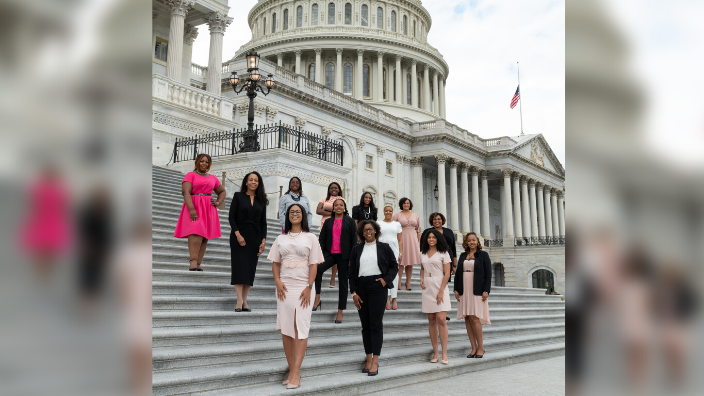
Staffers on Capitol Hill are known for staying behind the scenes, supporting their bosses who’ve been elected to Congress in order to do the People’s work. Hill staffers are the unsung heroes and sheroes who help members of Congress deliver necessary policy for their constituents.
The role of making government work can often be a faceless and thankless job, and it can be particularly so for Black staffers on the Hill. Much like in Corporate America or private-sector industries, Black women can especially be few and far between in government, which is why theGrio decided to spotlight a few of the faces we don’t often get to see.
Thirteen Black women staffers came together for a special photo shoot to highlight a pivotal and historic moment in Washington as a Black woman currently serves as vice president of the United States (Kamala Harris) and another is poised to be confirmed as the first Black woman to serve on the United States Supreme Court (Judge Ketanji Brown Jackson).
TheGrio was able to sit down with seven of the women to talk more intimately about what it’s like being a Black woman taking up space in a predominantly white, male arena, the glass ceilings that are being shattered in U.S. government and what inspired them to work in public service.
Read their stories and see them in their Black Girl Magic glory below.
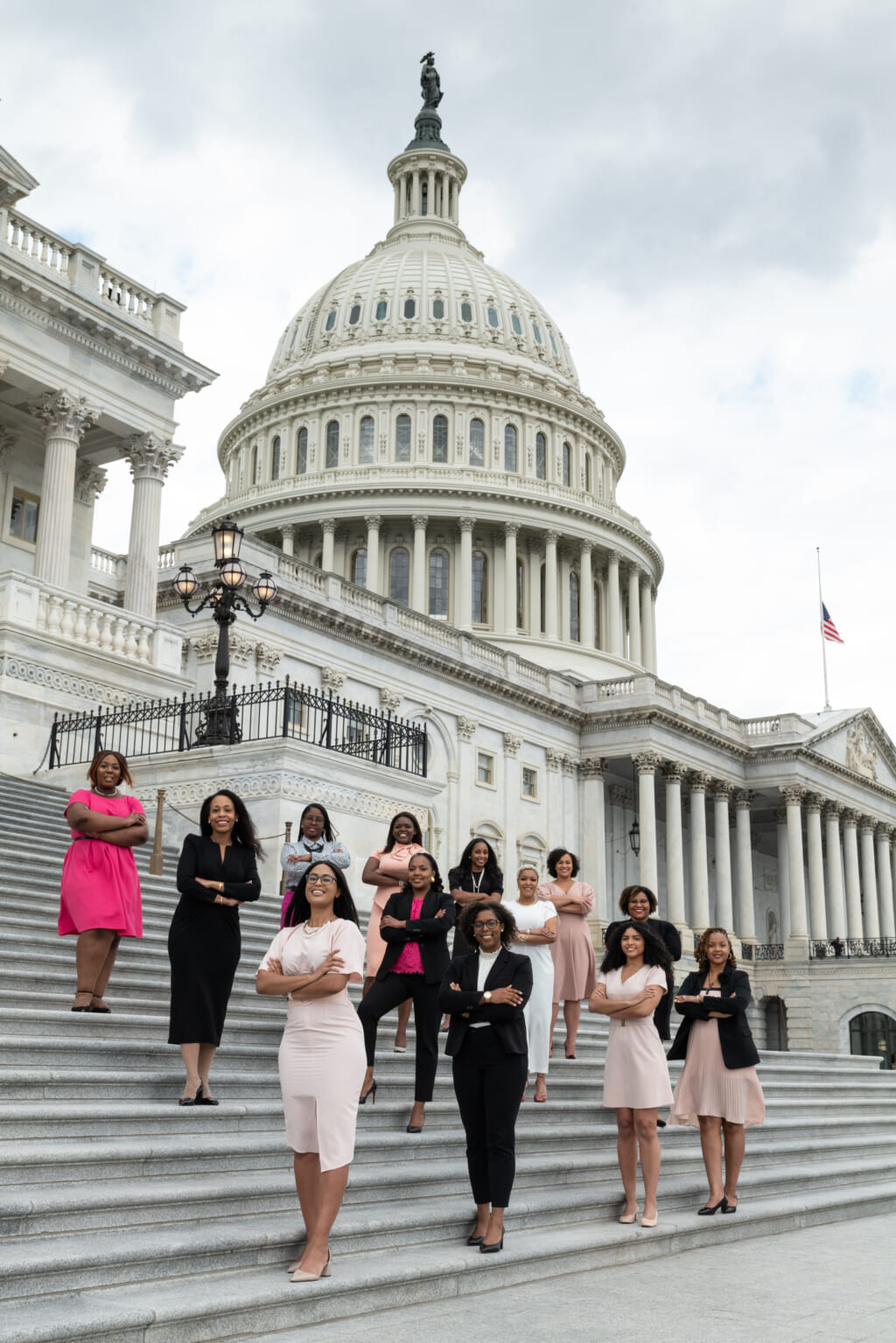
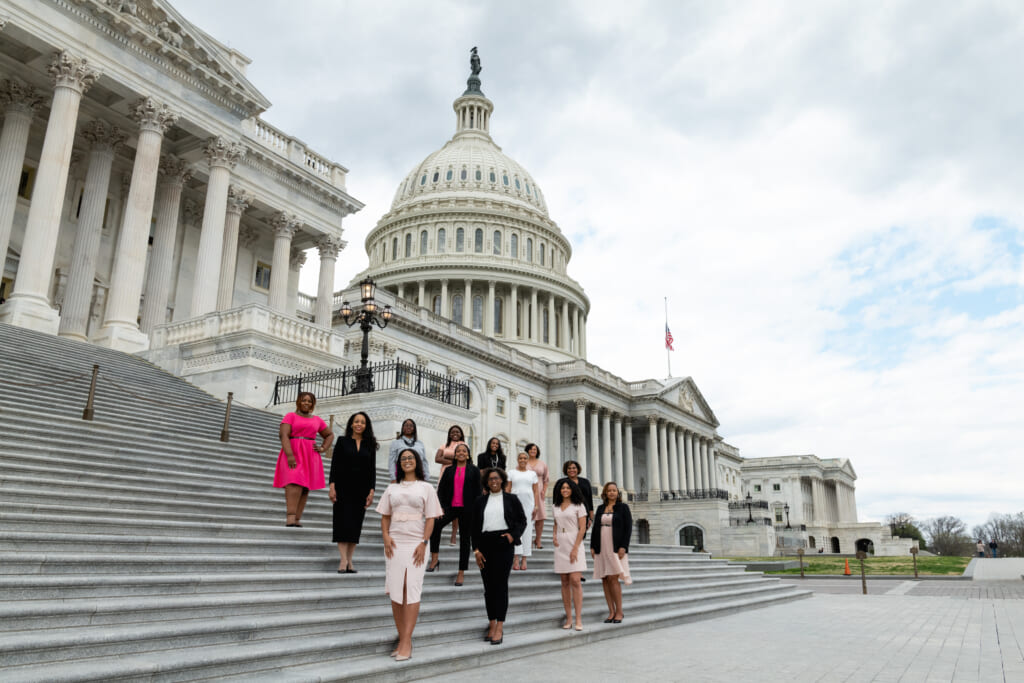
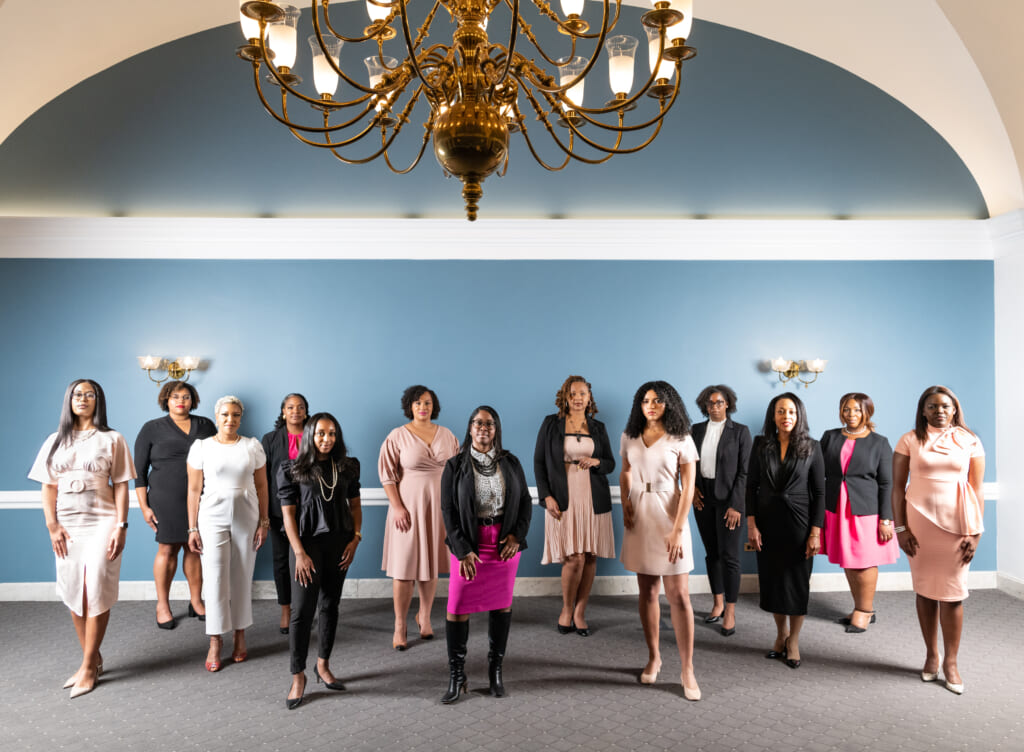
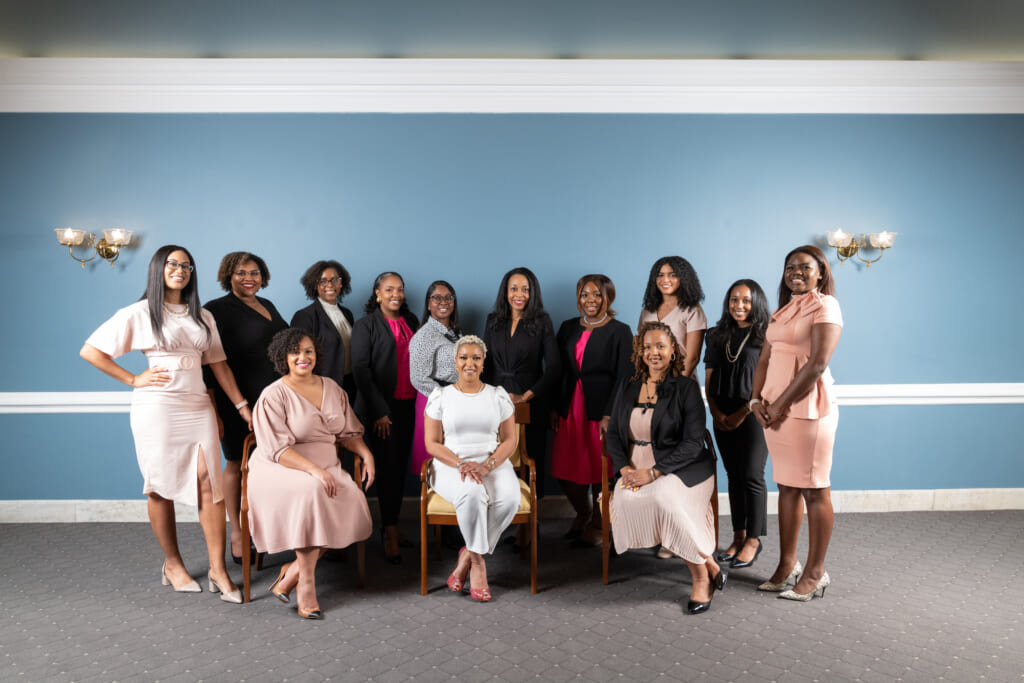
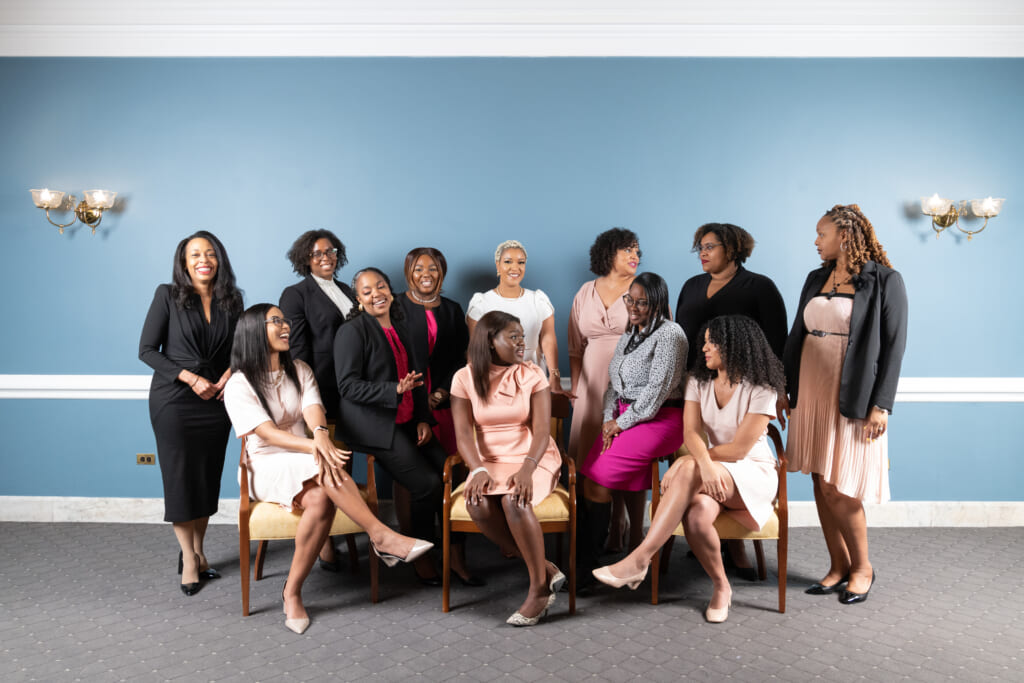
Black women staffers featured: Antonia Hill, Policy Advisor for House Majority Leader Steny Hoyer; Leah Hill, Legislative Director for U.S. Senator Cory Booker; Harleigh Bean, Operations and Strategic Planning Director for House Majority Leader Steny Hoyer; Wendy Hamilton, Outreach and Member Services Adviser for Assistant Speaker Katherine Clark; Hope Goins, Staff Director for the House Committee on Homeland Security; Wyndee Parker, National Security Adviser for House Speaker Nancy Pelosi; Bernadine Stallings, Deputy Communications Director for House Majority Whip James Clyburn; Kayla Primes, Legislative Assistant, U.S. Senator Jacky Rosen; Gabrielle Howard, Legislative Assistant and Acting Digital Director for U.S. Rep. Troy Carter; Maya Valentine, Maryland Press Secretary for House Majority Leader Steny Hoyer; Melanee Farrah, Chief of Staff for U.S. Rep. Nikema Williams; Taylor Ware, Education and Labor Legislative Aid for U.S. Senator Raphael Warnock; Tamika Mason, Director of Technology and Faith Outreach for House Majority Whip James Clyburn.
Kayla Primes
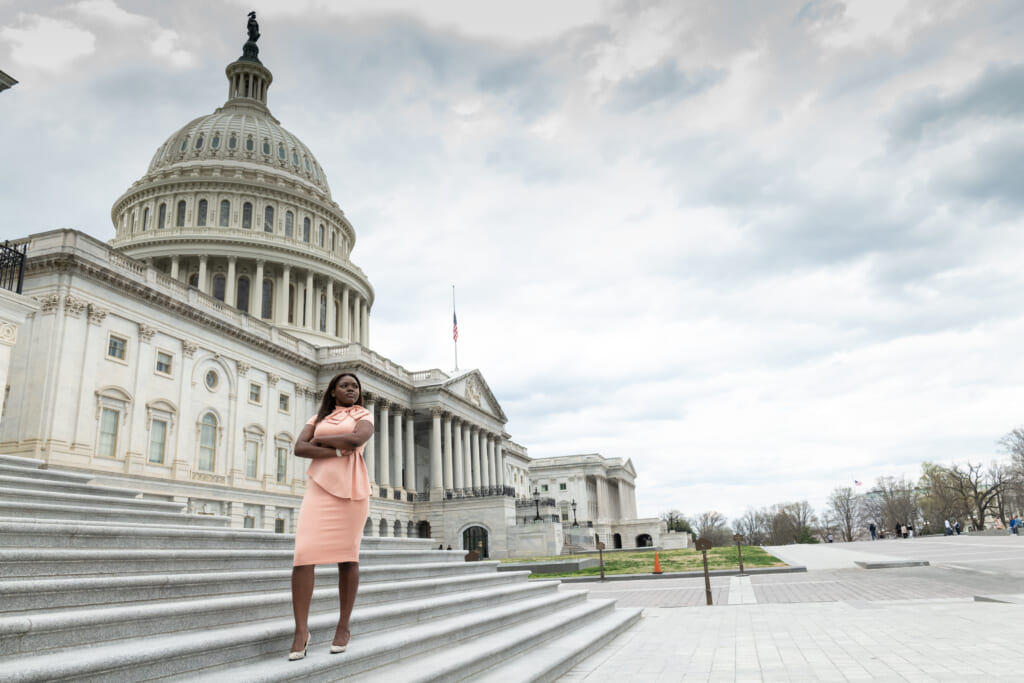
Legislative Assistant, U.S. Senator Jacky Rosen (D-IL)
President of Congressional Black Associates (CBA)
Hometown: Cleveland, Ohio
Education: Howard University (B.A. in Political Science and Government/Philosophy)
What does it mean to you to be a Black woman working on the Hill?
“Knowing that you are an important factor to creating change that you seek does definitely sound like a cliche, but when it comes to writing the policies and writing the laws, many people think it’s just the members of Congress, but it’s also a lot of people who are behind these members of Congress who are coming up with these ideas — and there are Black women doing it too. So I enjoy it. I feel like I’ve always had a dream of being on the Hill for a very long time. So for me to be here is definitely truly a blessing. This role is very important to me. It has its ups and downs, but I’m very appreciative of the community that is present because I feel we do have a sisterhood and there is a very strong pipeline bringing Black women and men on the Hill. On the Hill, there are Black women senior staffers who want to mentor you and guide you through. There is no information that you can find online about how to maneuver the Hill. I’m definitely appreciative of the sisterhood here.
What are some challenges to being a Black woman staffer on the Hill?
“There’s not many of us. Sometimes we do get stereotyped and it may be hard to maneuver through that. Many of us are all in predominantly white offices. Sometimes you feel like you can’t be yourself, but then you have to realize if that’s who I am, then that’s who I am. I feel like that sometimes is challenging but when you have other people who can share your experiences it definitely gets better.”
What does it mean to you to be a Black woman on the Hill during a time when the vice president of the United States and potentially the next Supreme Court nominee are Black women?
“It’s empowering. It was a very emotional week as we saw the confirmation hearings for Supreme Court Justice nominee Kentanji Brown Jackson. It definitely was a rollercoaster of emotions, but overall, it makes me happy. It’s like, OK, we’re here, we’re making these good steps, and it’s great to have people that we can look up to like, OK, I could be in that seat. My friend could be in that seat. My colleague can be in that seat. So I’m really excited for what’s to come. Black women, we run the world.”
Where do you see yourself in the future?
“I actually want to run for office. I want to be a senator of Ohio. Just bring it back home, full-circle moment. So you’ll be hearing more!”
Maya Valentine
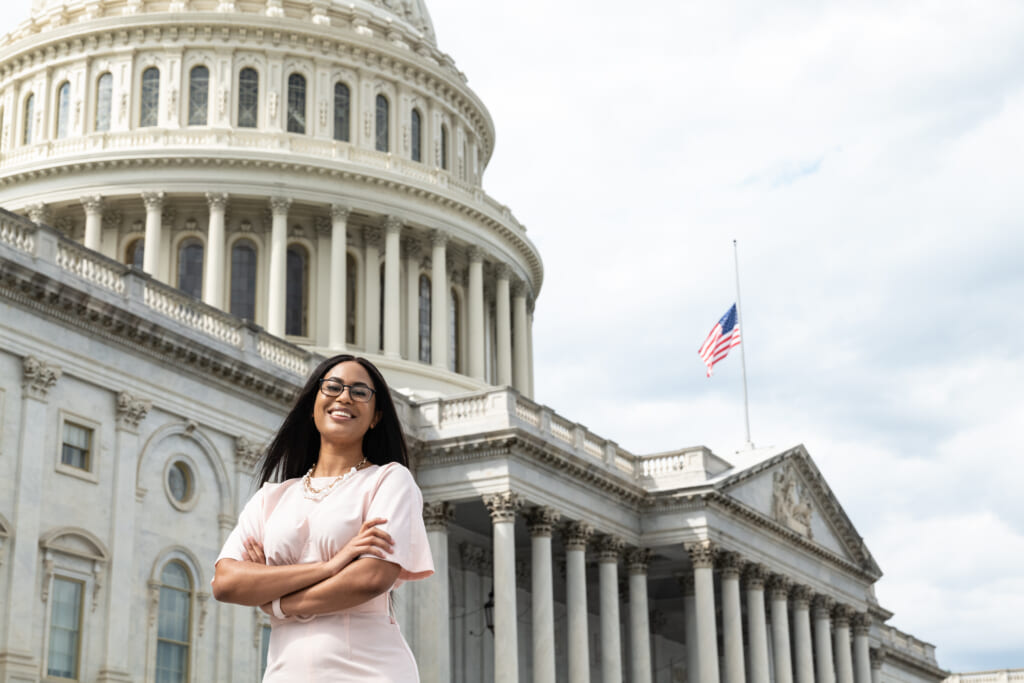
Maryland Press Secretary, House Majority Leader, U.S. Congressman Steny Hoyer
Vice President, Congressional Black Associates (CBA)
Hometown: Los Angeles, California
Education: Simmons College (B.A. in Public Relations/Communications and Journalism)
What does it mean to you to be a Black woman working on the Hill?
“I think the best part is the humility that comes with it. Five, six years ago, if you told me I’d be working in an institution like Congress, I would have not believed you. I think it’s empowering. Every day, you walk through the same halls to get to the same office, but you’re doing different work and it’s exciting and it’s meaningful. For me, it’s how I think I can make the greatest change for the people I care about the most. It’s something special because I have to remind myself that I didn’t get here without someone paving the way. I’m not ungrateful for that. There’s a sense of responsibility, but also gratitude. I think that kind of shows in the work that I do, especially when you have moments like having the first Black woman vice president or having an upcoming Black woman sitting on the Supreme Court bench.”
What made you want to work in public service?
“Growing up, my family faced its fair share of structural barriers to succeed. I saw that in my immediate family and broader family. I always kind of knew that from a young age. My mother would say as a Black woman you’re going to have it 10 times harder. And that stuck. As a young girl, I was being taught these things. I didn’t know what I wanted to do after college, but I knew I wanted to make a difference, and that’s what kind of got me here. There was sort of like magnetism to the Hill where you either really love it and you’re drawn into it and you stay or you don’t. And I was the former. I really loved what I did because I felt like every day I was coming in and the work that I was doing and the hours I was doing it meant something. It meant something for my boss and for the party that I work for, but more importantly, I could go back home and say, this is what’s happening and it matters to you and us because of these reasons, and that was special to me. I wanted to be able to articulate the sort of change that was happening at a greater level for people.”
What are some challenges to being a Black woman staffer on the Hill?
“The challenges are a bit nuanced. You know that you’re a part of a very small pool of very talented women, and that can sometimes be an incredibly special feeling, but also daunting because of the barriers you have to break to get to a place like this as a Black woman — they’re intense. You don’t just waltz into the Capitol and get a job. You have to work really hard for it. And there are systemic barriers that I think about all the time. Even like on a day like today, when you see only a handful of like Black women show up in these sorts of senior, mid-senior level roles. We got a lot of work to do.”
What does it mean to you to be a Black woman on the Hill during a time when the vice president of the United States and potentially the next Supreme Court nominee are Black women?
“In those rare moments where you see other Black women make history, it really kind of puts what you do as a Black woman on the Hill in a bit of context. We’re fighting for a reason. We’re fighting so people can look up to us in those same sorts of ways. I’m also on the board of CBA as its vice president and that’s important for me to represent a community of Black Hill staffers as a Black woman because for me it was about leadership and it was about making sure that the community that I serve, both internally and off the Hill, know that Black women can ascend and be at the highest pillars of what they do.”
Where do you see yourself in the future?
“I’d love to eventually be a comms director. I know a lot of women in my office and generally on the Hill who have dominated that profession, and I aspire to be like them. I could also see myself eventually going back to school to become a lawyer. A part of my long-term dream is to be sort of a legal analyst or a policy analyst on a media network like CNN and MSNBC.”
Gabrielle Howard
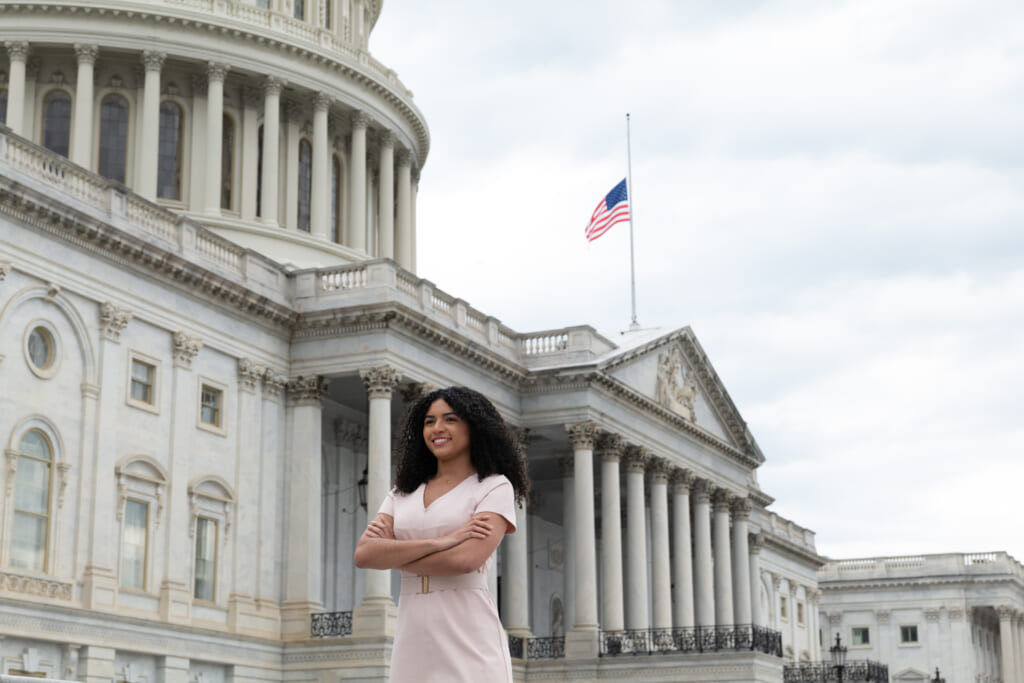
Acting Legislative Director and Digital Director, U.S. Congressman Troy Carter (D-LA)
Communications Director, Congressional Black Associates
Hometown: McKinney, Texas
Education: DePaul University (B.A. in African and Black Diaspora Studies/Clinical Psychology and M.A. in Public Policy)
What made you want to work in public service?
“In college, I double-majored in psychology and African and Black Diaspora studies, and in all my classes, the professors would always talk about statistics for racism. Black people and other minorities always came with negative connotations around them. And then in my African and Black diaspora studies classes, I learned more about the history of our country and the history of Black people and that a lot of the reasons why we’ve had to struggle is because of the policies that have been put in place. I thought that the best way to help Black people was to be where the policies are being made so that I could try and change them.”
What does it mean to you to be a Black woman on the Hill during a time when the vice president of the United States and potentially the next Supreme Court nominee are Black women?
“It’s really a blessing, and it’s amazing to see Black women in those leadership roles that they’ve never been able to be in before. To be here in this moment with the first and knowing that they are going to be more after them is very inspiring to be here during this time.”
Where do you see yourself in the future?
“For the future, I hope to be doing what I came here to do, which is to make the world a more equitable place, especially for Black people and other minorities.”
Melanee Farrah
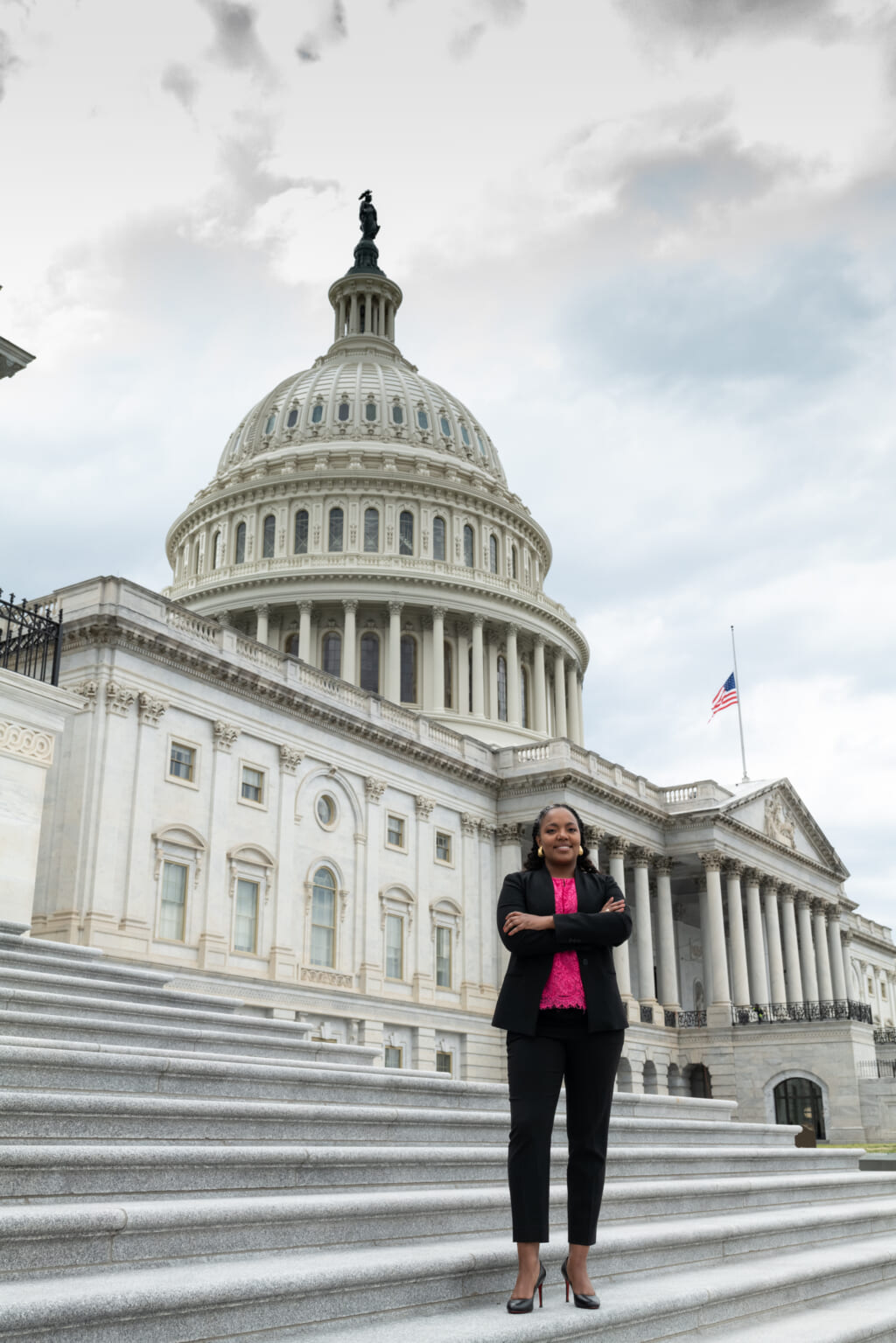
Chief of Staff, U.S. Congresswoman Nikema Williams (D-Ga)
Hometown: Queens, New York
Education: University of Maryland College Park (B.A. in Government and Politics), George Washington University (M.A. in Public Policy and Education Leadership)
What does it mean to you to be a Black woman working on the Hill?
“It’s an honor and a responsibility. To be a Black woman on the Hill is to proudly do the work of service with the responsibility of paving the way for more people that look like me to be able to do the same work. So you are doubly conscious of your work, the outcomes and the impact that you’re having, not just on the people in your office, but the people that you work with, the people in your community, your constituency. It’s a big deal.”
What made you want to work in public service?
From the time I was 5 or 6, I’ve been involved in rallies and motivating people to come out to vote. I had a distant relative, who was a local assemblywoman in New York, and our every day was making sure everyone understood the value of civic education because politics touches everything that you and I do. It behooved me, even at 6 years old, to tell you that it matters that you vote because when you vote you have more control over the decisions that you make every day. I started young, passing out placards and getting people interested in different candidates. From that point, I just stayed involved through high school and college. I was a CBCF intern many years ago, and so to be back here almost 20 years later is a big deal for me. It’s a full circle.
What are some challenges to being a Black woman staffer on the Hill?
“One of the primary challenges, I think, is the assumption of people’s version of who people think Black women are. We are not a monolith. We don’t all think the same. But I can say from my experience — and every Black woman on the Hill that I know — I’ve had the benefit of knowing how hard we work as a collective to fight against any preconceived notions of who we are. We are not all angry. We are not all full of attitude. We are proud of who we are. We are proud of how we look. We are proud of our hair. I am not ashamed to be a Black woman and I want to carry that through to every intern or staffer who comes through my office to know that this is the best thing happening — and not just right now. It’s been that way, but everybody’s just finding out.”
What does it mean to you to be a Black woman on the Hill during a time when the vice president of the United States and potentially the next Supreme Court nominee are Black women?
“It is the culmination of everything that I’ve worked for and it is the ideation of the people that I’ve worked with. I proudly work for Congresswoman Nikema Williams, so I serve in the office of a Black woman who has been doing this work and has been knocking down firsts as the first Black woman chair of the Democratic Party of Georgia. Seeing us represented by Vice President Kamala Harris and seeing us represented through Judge Ketanji Brown Jackson is the dream come true. It’s what we ideated in actuality. It’s amazing and it gives me goosebumps just as much as it peeves me to see people treat [Judge Jackson] that way during the confirmation hearings. At the end of the day, though, it’s not something that we’re not used to hearing or experiencing, it’s just something that everyone else is getting to see. It is the demonstration that we have to fight for our dreams to come true, but also the confirmation that our dreams still do come true.”
Where do you see yourself in the future?
“As a chief of staff, you just don’t see yourself beyond the person you’re fighting for. You are in the moment living the dream. And right now, for me, I see my career path working to take my member to the next level to leadership. I’m on this ride and we’re on our way up.”
Taylor Ware
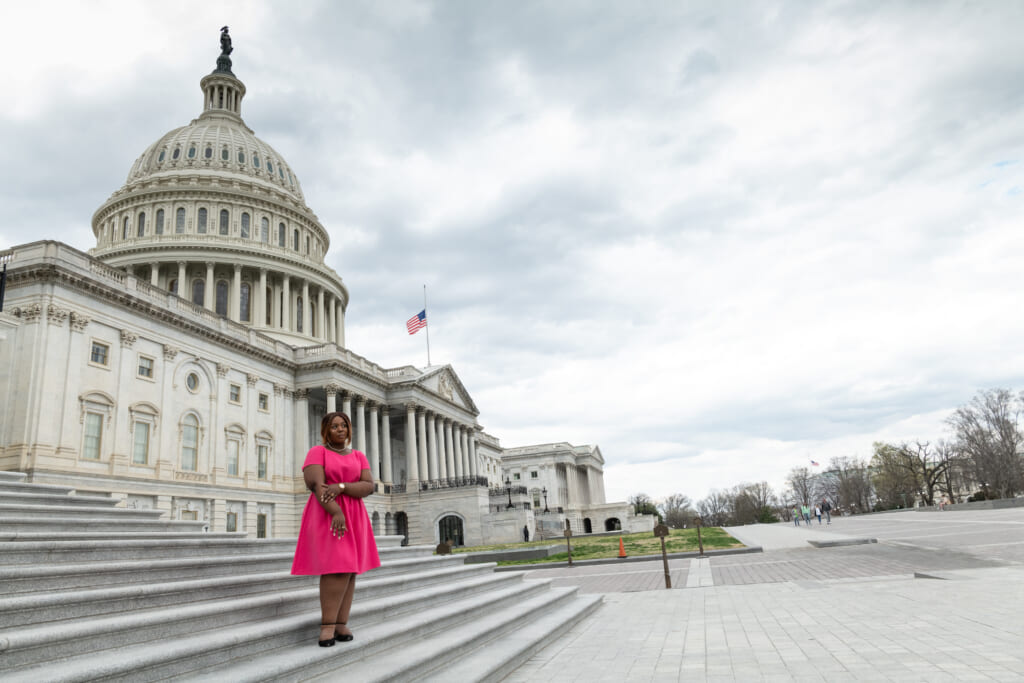
Education and Labor Legislative Aide, U.S. Senator Raphael Warnock (D-GA)
Hometown: Prince Georges County, Maryland
Education: Washington University in St. Louis (M.A. in Legal Studies), Penn State University (B.A. in Political Science and Government/African Studies)
What does it mean to you to be a Black woman working on the Hill?
“This has been something I’ve always wanted to do, probably since middle school. I found it really important for people to be engaged with the government. And so as a Black woman, I think a lot of that means just demonstrating to the public that Black voices matter on the Hill and that Black voices deserve to be represented on the Hill. Being able to take up a space that’s so influential means a lot, and to now be someone that folks tend to see as leadership, at least on the staff level, is a huge honor and privilege.”
What made you want to work in public service?
“Funny enough, I did a report on Condoleezza Rice back in the fourth grade. I didn’t know who she was and I didn’t know much about what she did, but I knew that she was able to make a difference in her community. I knew her access and closeness to power being appointed to a secretary position, and being a Black woman and being able to go from a community where not many folks would acknowledge that potential is there and being able to rise to that type of position. It really inspired me. She majored in political science and that’s how I chose my major. And from there, everything just kind of fell into place with interning on the Hill in high school and just progressively making my way deeper into the Capitol Hill complex.”
What are some challenges to being a Black woman staffer on the Hill?
“I think we saw it with the Supreme Court nominations and just seeing how much work it takes sometimes for Black women, very highly-qualified Black women, to claim the spaces that they should occupy. And as a staffer, it’s just constantly a reminder of the fact that, while I’m not getting grilled on the national stage, these are sometimes the attitudes that are held by members of the body that I work for. There’s just constantly this reality that while I might not directly experience these things, these attitudes exist and that in many ways I have to perform in such a way that I live up to the expectations or exceed the expectations. Meeting the expectation is not an option. You have to go above and beyond as a Black woman on the Hill. And while it’s something I’m happy to do and I love the work, it can be tiring sometimes.”
What does it mean to you to be a Black woman on the Hill during a time when the vice president of the United States and potentially the next Supreme Court nominee are Black women?
“I would certainly say it empowers me more. Beyond the realization that both of these positions are attainable for someone like me, it also just underscores the need for Black women to be staffers in these spaces and understand the value and perspective that we bring to these spaces and the fact that there are Black women who worked to support the nomination hearings and there are Black women who have worked on Capitol Hill who are now supporting Vice President Harris. It really underscores the importance of persevering and staying in this space and owning the power that we have in this space.”
Where do you see yourself in the future?
“The short answer is I have no clue (laughs). I think about this question all the time, but definitely somewhere where I can be impactful on education policy more broadly, but Historically Back Colleges and Universities (HBCUs) have been something that I’ve been very fortunate to work on in most of the offices that I’ve worked in. My father is an HBCU graduate and so being able to influence policies for that community is really meaningful to me, and I would love the opportunity to continue doing that throughout my career.”
Bernadine Stallings
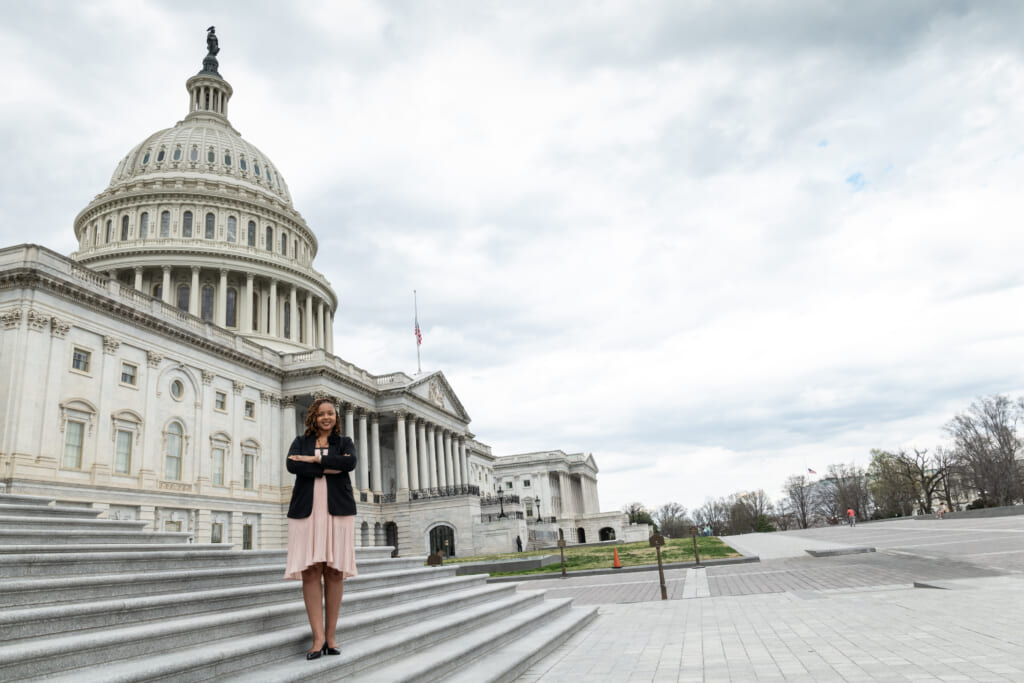
Deputy Communications Director, House Majority Whip U.S. Congressman James Clyburn (D-SC)
Hometown: Detroit, Michigan
Education: Wayne State University (M.A. in Communications/Journalism), University of Michigan (B.A. in English)
What does it mean to you to be a Black woman working on the Hill?
“I take great pride being a Black woman working on the Hill because you don’t see a lot of us, especially in top staff roles. It means a lot, especially at this moment working at the same time as we have a Black and Asian American vice president and seeing a Supreme Court nominee who looks like me. It makes me proud to know when I drive up to the Capitol every day that I’m working in this institution that has been the pinnacle of our democracy and in our country’s history. I am a part of history just being involved in so many things like being able to be on the House floor when they gaveled in The Crown Act as a woman wearing locs; or being on the floor when they’re passing bills that will impact my people back home. It just means a lot to be here ‘in the room where it happens,’ and work for the majority whip who is always making history and doing what’s in the best interest for Black people and all people…I’m just proud and excited to be a part of that.”
What made you want to work in public service?
“Before I came to the hill, I was working for Delta Sigma Theta Sorority Inc. as their communications specialist, and annually we would have our legislative conference on the Hill — Delta Days in the Nation’s Capital. Attending all the events, hearing great speakers and political leaders come to really galvanize not just Delta women, but also our community, was inspiring. The more I became politically aware and Hill savvy, the more I began to really understand that every decision here impacts what goes on at the local level. It amazed me to see that and reinforced why it’s so important that we all get out there and vote — and take seriously who you vote for — because you want people who will work for your best interests. Yes, Washington, D.C. might be far away for a lot of people, but everything that happens here, in these hallowed halls impacts what happens in education, in homelessness, in health care, in election administration and other areas affecting the Black community. That’s what really makes me excited about working in public service.”
What are some challenges to being a Black woman staffer on the Hill?
“One challenge is having imposter syndrome when you first come to the Hill knowing that you’re working with a majority of white male colleagues in some rooms and they’ve studied political science, and they’re studying to be lawyers or are lawyers. Not to downplay my own education, but have a degree in English and I had no interest in studying political science at the University of Michigan. When I first came here, I felt like I was an imposter, until I began to realize that they don’t know any more than I knew. I really built up my confidence in knowing that I can do this job and that I am worthy to be here. That’s the lesson I like to stress to other Black women and Black people in general, including interns, who are new to the Hill — you are worthy to be here. The other challenge is trying to break into leadership roles. I was blessed to come in as a comms director, but everyone isn’t as fortunate. Before working for the majority whip, I wanted to try to work for the Senate. I was told it’s hard for African Americans to get comms director jobs in the Senate, especially when just two years ago or at the start of this Congress, there were only 10 Black comms directors out of probably 100 or more. That’s a low number, and those are the current odds that you have to deal with being Black and a Black woman.”
Where do you see yourself in the future?
“I just want to work in a place where my opinions are respected, where my work and my knowledge are respected. I love doing communications and I hope that I’m not the last and that there can be more Black women that come behind me in leadership roles. It’s important that we have a diverse staff. I’ve been blessed to work for three members of Congress who all had diversity in their staff. When you have that diversity at the table, you learn a lot, but you also don’t become tone-deaf to the needs of others. So that’s my goal for the future in my career — and to have peace and enjoy doing what I do.”
Tamika Mason
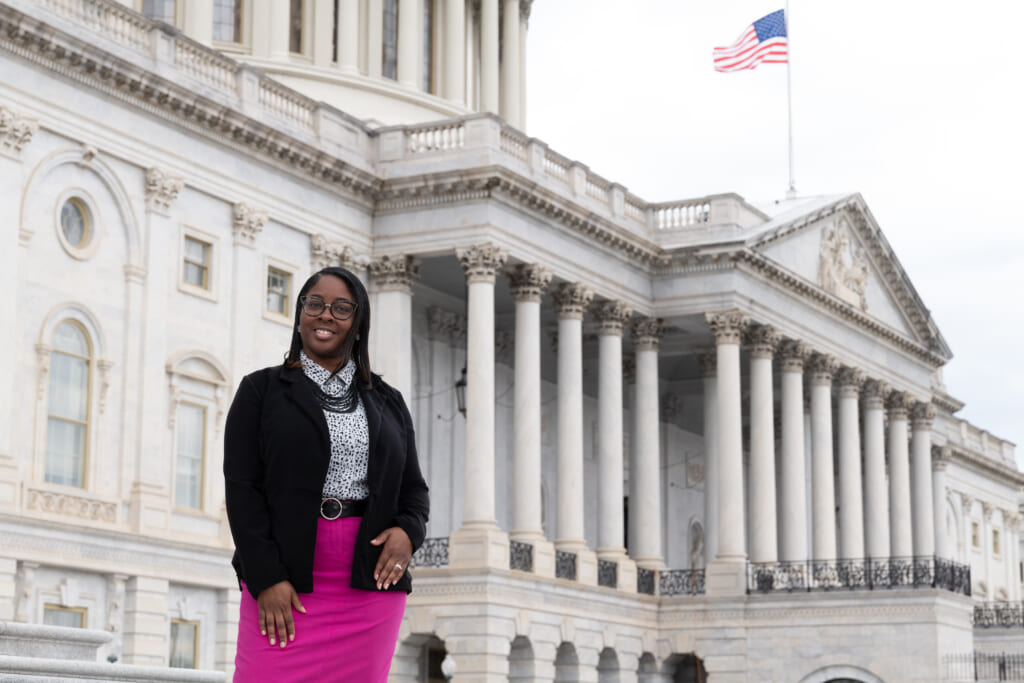
Director of Technology and Faith Outreach, House Majority Whip U.S. Congressman James Clyburn (D-SC)
Hometown: Capitol Heights, Maryland
Education: Bowie State University (B.A. in Computer Technology)
What does it mean to you to be a Black woman working on the Hill?
“It is a true honor. In my 14 years here, I have watched this place transition, if you will. When I first started my career on Capitol Hill in 2007, there were not many Black women here. At that time, there was an organization called, African American Women on the Hill Network. Its purpose was to connect current and former Hill staff in order to support each other’s professional goals and objectives. We would meet regularly and I believe it played a tremendous role in the success of Black women on Capitol Hill and helped increase the presence of Black women on Capitol Hill. There was a time when I would be the only Black woman in the room. Now you can almost bet that there will be, at the very least, two other Black woman in the room. It’s an absolute honor to see that history change over time and to see the number of organizations that are helping promote Black women and our success here in this political world. Black women are continuing to make an impact in history.”
What made you want to work in public service
“Funny story — I was not inspired to work in public service (laughs). I was temping at a lobbying firm, after being out of college for about a year and had plans of running my own web development company. I did web development for a while, it wasn’t kicking off the way that I needed it to financially. I needed steady work with some benefits. One day at work, the President of the lobbying firm brought me to the Capitol for a meeting in the Majority whip’s office, where I met my chief of staff. At that time, the staff assistant was leaving, so they were looking for a replacement. My chief of staff mentioned the position to me, and I honestly didn’t even know what I was getting into. I knew this was the federal government, which meant steady income and good benefits (laughs). I said, sign me up and I’ll figure it out if given the opportunity. He gave me the opportunity, and I grew from there.
I was a staff assistant for two years. Then, the director of technology at that time left, and so my chief of staff remembered that I had a technology background. He asked me if this was a role that I was interested in and I said absolutely. That’s how I became the system administrator. For me, it was great because now I’m able to use my degree in technology while also doing policy as the director of outreach. As the director of faith outreach, I’m able to meet with national faith and community leaders to work on different policy issues. It’s amazing how it all works out because, you may think that you have a path set for yourself but then the Lord will be like, ‘Oh, that’s what you thought you were doing?’ So, I kind of entered public service by happenstance. But, I’m grateful to be here because I have been able to learn so much about this institution and this political world. Like the Capitol building, how it was built, by whom it was built and making sure that history is accurately reflected for generations to come. Then to work for the highest-ranking African American in the House, Congressman Clyburn, I’m like, wow God is so good! It was absolutely nothing that I had any control over.”
What does it mean to you to be a Black woman on the Hill during a time when the vice president of the United States and potentially the next Supreme Court nominee are Black women?
“It brings my heart so much joy. It makes me so excited to see it all happening. I’m 40 years old and when I was a young girl, when we would talk about a Black person being president, it was unheard of. You would hear people say all the time, we would never have a Black person be president. It was just the craziest thing to imagine. And then, President Obama became president, which was mind-blowing, and it stirred up so much joy and pride in the Black community. It changed the way we look at our future as a community. My nieces and nephews will never have the mindset that a Black person could never be president or vice president because they have witnessed it. If there wasn’t an Obama, we probably would not have had Vice President Harris. For her to be sworn in as vice president makes me feel like the work that I have seen being done here on Capitol Hill is impacting the community. So, coming from Vice President Kamala Harris to now having Judge Ketanji Brown Jackson being nominated is just a phenomenal feeling. It’s no better time in history to be here and see it up close.”
What are some challenges to being a Black woman staffer on the Hill?
“As we have seen with the questions asked of Judge Ketanji Brown Jackson during her hearing, Black woman are made to appear as if they are never qualified enough for the position. We continue to be pushed above and beyond what others must do to succeed. We’ve overcome a lot, but we still have barriers to climb. And because we know that, we put more pressure on ourselves.”
Where do you see yourself in the future?
“Honestly, I have not figured that out yet. I feel like that can be a good and a bad thing. People tell you that you should always have a five-year plan. I agree, but then when I look back over my life, that plan was altered once before. So, I don’t necessarily have a specific direction that I want to go in, but I set goals to ensure that I progress to the next level. The good thing that I would say about the position I have now is that it has allowed me to have flexibility. I can do technology or I can do community outreach. I’m enjoying doing both right now. If there comes a point where I feel like I have to choose, I will have a hard decision to make.”
TheGrio is now on your TV via Apple TV, Amazon Fire, Roku, and Android TV. Also, please download theGrio mobile apps today!”
